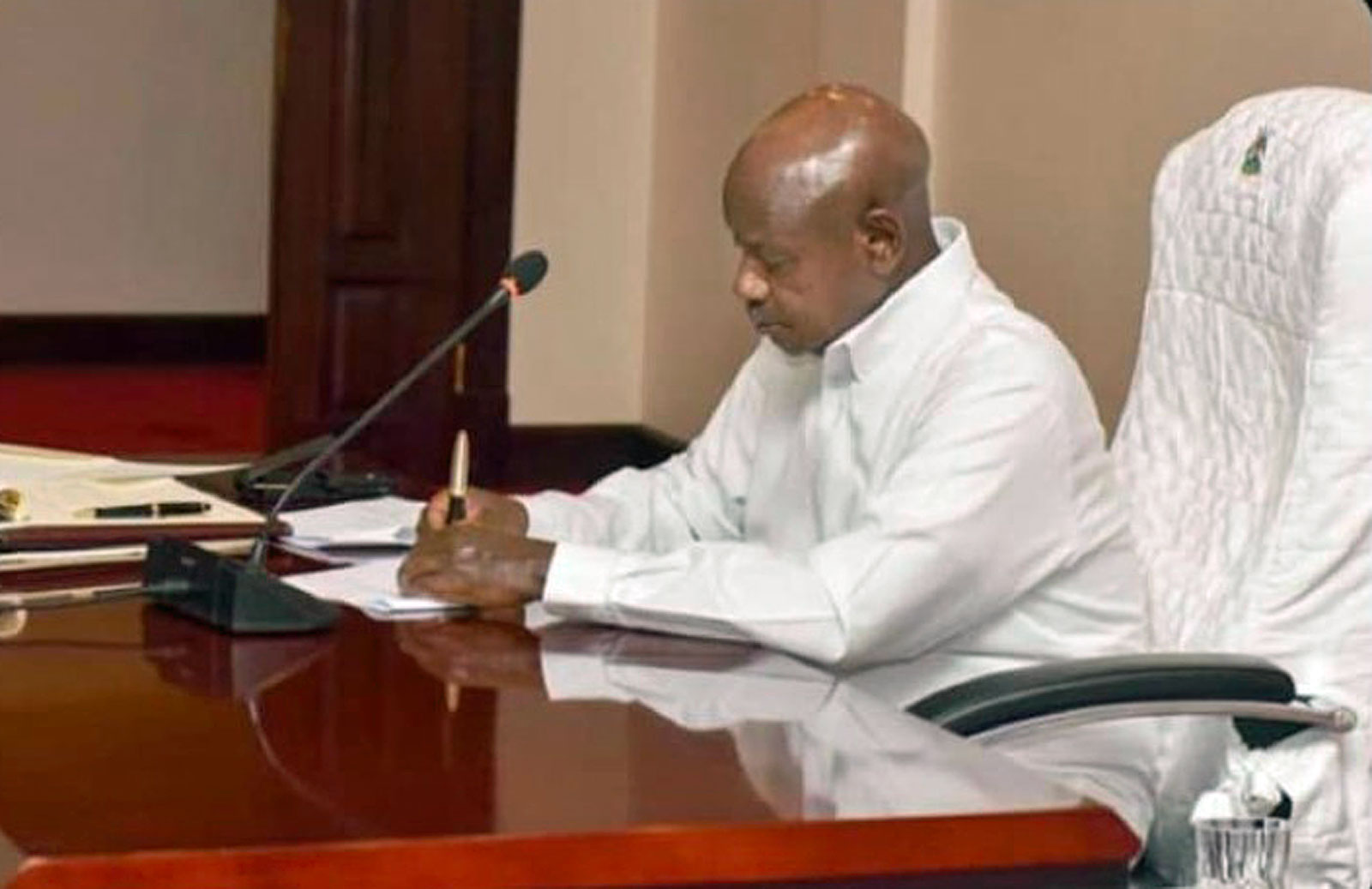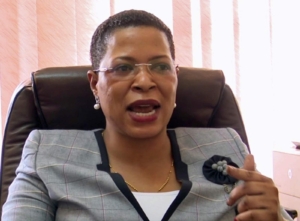
Uganda President Yoweri Museveni signs Anti-Homosexuality Bill 2022, turning it into the Anti-Homosexuality Act 2023. (Photo courtesy of State House Uganda)
Uganda President Yoweri Museveni today signed the cruel, punitive Anti-Homosexuality Bill. Human rights advocates immediately prepared to appeal it to the Constitutional Court and issued a call for punitive sanctions on Uganda.
“A dark day for human rights of LGBTQIA+ and allies,” tweeted Ugandan activist Kasha Jacqueline.
Leaders of the Global Fund, UNAIDS and PEPFAR issued a joint statement bemoaning Museveni’s action because it will undercut progress in the battle against AIDS by stigmatizing people who are most at risk of HIV infection and erecting barriers to HIV treatment. They stated:
Uganda’s progress on its HIV response is now in grave jeopardy. The Anti-Homosexuality Act 2023 will obstruct health education and the outreach that can help end AIDS as a public health threat. The stigma and discrimination associated with the passage of the Act has already led to reduced access to prevention as well as treatment services. Trust, confidentiality, and stigma-free engagement are essential for anyone seeking health care. LGBTQI+ people in Uganda increasingly fear for their safety and security, and increasing numbers of people are being discouraged from seeking vital health services for fear of attack, punishment and further marginalization.”
Supportive words for LGBTQ Ugandans flooded in from abroad. Among them:
The Kenyan LGBT+ advocacy group Galck+ Here For All stated, “The passing of the Anti-Homosexuality Bill in Uganda is a devastating blow to the LGBTQ+ community within the country. Our hearts go out to all those affected by this discriminatory law as we condemn any form of oppression and champion the right to love freely and authentically.”
From the UK, the Kaleidoscope Trust stated, “We’re extremely disappointed to see that Uganda’s Anti-Homosexuality Bill has been signed into law. To the LGBTI+ community in Uganda: we stand in solidarity with you and will continue to fight with until your rights are fully realised and protected.”

Anniken Huitfeldt (Photo courtesy of UNPAS)
Norway’s minister of foreign affairs, Anniken Huitfeldt, stated “This law will threaten human rights & increases persecution and discrimination of all Ugandans. Norway stands firmly against the use of capital punishment at all times and under any circumstances.”
The Rev. Jide Macauley, an Anglo-Nigerian LGBTQ rights activist in the U.K., promoted a petition calling for a travel ban on Ugandan MPs and clergy who supported the Anti-Homosexuality Bill.
Museveni’s enactment of the bill was the act of “an aging dictator in a grasp to hold onto power,” stated Melanie Nathan, leader of the U.S.-based African Human Rights Coalition. “The hype in the country for the need for such legislation among the populace follows a decade or more of scapegoating and lies that placed gays, lesbians, trans and bisexual people squarely responsible for the ills the land, a land so steeped in corruption and oppression of freedoms. This has given Museveni his perfect shield to hide behind, averting the real reasons for the country’s problems, with its very trajectory reminiscent of Hitler’s hold on Germany where Jews became the target, ending in genocide. The road to the legislation, the scapegoating behind it, the interim laws, and the hunts all yielding many Ann Franks in hiding, as we speak, while others flee.”
She noted: “We are informed by Uganda’s leading activists that a lawsuit is ready to go. This new law is clearly unconstitutional and it will be challenged in the courts immediately.”
Reuters reported on the signing:
Uganda enacts harsh anti-LGBTQ law including death penalty
KAMPALA, May 29 – Uganda’s President Yoweri Museveni has signed one of the world’s toughest anti-LGBTQ laws, including the death penalty for “aggravated homosexuality”, in defiance of Western condemnations and potential sanctions from aid donors.
Same-sex relations were already illegal in Uganda, as in more than 30 African countries, but the new law goes much further.
It imposes capital punishment for some behaviour including transmitting a terminal illness like HIV/AIDS through gay sex, and stipulates a 20-year sentence for “promoting” homosexuality.
“The Ugandan president has today legalised state-sponsored homophobia and transphobia,” said Clare Byarugaba, a Ugandan rights activist. “It’s a very dark and sad day for the LGBTIQ community, our allies and all of Uganda.”
She and other activists have vowed a legal challenge to the law, which Museveni was shown signing at his desk with a golden pen in a photo tweeted by Uganda’s presidency.
The 78-year-old leader has called homosexuality a “deviation from normal” and urged lawmakers to resist “imperialist” pressure.
A less restrictive 2014 anti-LGBTQ law was struck down by a Ugandan court on procedural grounds, after Western governments had initially suspended some aid, imposed visa restrictions and curtailed security cooperation.
Uganda receives billions of dollars in foreign aid each year and could now face further sanctions.

Anita Among, Speaker of the Parliament of Uganda. (Photo courtesy of NTV)
The bill’s sponsor, Asuman Basalirwa, told reporters that parliament speaker Anita Among’s U.S. visa was cancelled after the law was signed. Among and the U.S. embassy in Uganda did not immediately respond to requests for comment.
The White House condemned the bill after it was first passed in March, and last month, the U.S. government said it was assessing the implications of the legislation for activities in Uganda under PEPFAR, its flagship HIV/AIDS programme.
Dominic Arnall, chief executive of Open For Business, a coalition of companies that includes Google (GOOGL.O) and Microsoft (MSFT.O), said the group was deeply disappointed.
“Our data shows that this law runs counter to the interests of economic progress and prosperity of all people in Uganda,” he said.
The European Union reiterated a condemnation from March while the United Nations human rights body said the law was a recipe for systematic violation of Ugandans’ rights.
“We are appalled that the draconian and discriminatory anti-gay bill is now law,” it tweeted.
Uganda’s move could encourage lawmakers in neighbouring Kenya and Tanzania seeking similar measures.
“With a lot of humility, I thank my colleagues the Members of Parliament for withstanding all the pressure from bullies and doomsday conspiracy theorists in the interest of our country,” speaker Among said in a statement.
The inclusion of the death penalty for offences like transmitting HIV has drawn particular outrage.
Existing Ugandan law calls for a maximum 10-year sentence for intentionally transmitting HIV and does not apply when the person who contracted the infection was aware of their sexual partner’s HIV status.
By contrast, the new law makes no distinction between intentional and unintentional transmission and contains no exception based on awareness of HIV status.
Uganda’s LGBTQ community is afraid: many have closed down social media accounts and fled their homes for safe houses.
Some are looking to go abroad.
Museveni had sent the original bill back to lawmakers, asking them to tone down some provisions. The amended version stipulated that merely identifying as LGBTQ is not a crime and revised a measure that obliged people to report homosexual activity to only require reporting when a child is involved.
Source: African Human Rights Media Network member Erasing 76 Crimes.
COMMENTS